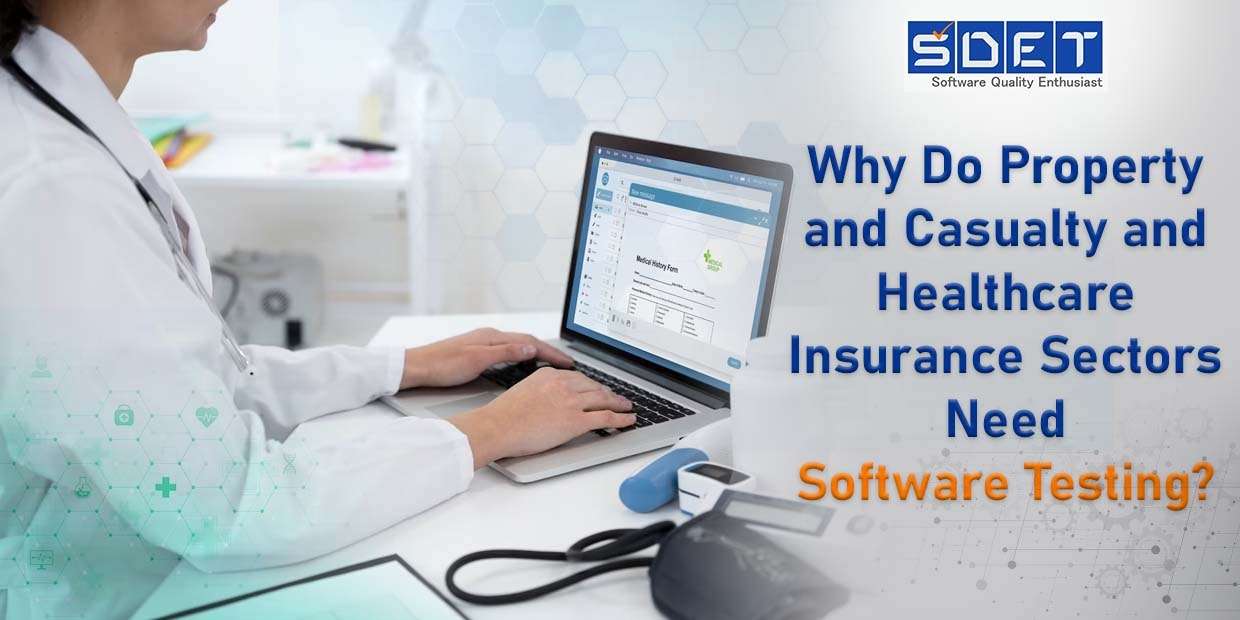
Why Do Property and Casualty and Healthcare Insurance Sectors Need Software Testing?
In an era driven by digital technology, the insurance industry, including property and casualty (P&C) and healthcare insurance, has undergone a significant transformation. The use of software and technology in insurance operations has become indispensable, streamlining processes, enhancing customer experiences, and improving data management. However, this rapid digitalization comes with its own set of challenges and risks, making software testing a vital component in ensuring the reliability and efficiency of insurance systems.
The Digital Revolution in Insurance
Before delving into the importance of software testing, it’s crucial to understand the magnitude of the digital transformation in the property and casualty and healthcare insurance sectors. The adoption of software and technology has led to:
- Enhanced Customer Experience: Insurers now offer digital platforms for customers to purchase policies, file claims, and receive real-time support. This has made insurance more accessible and user-friendly.
- Efficiency and Automation: Insurance companies use software to automate underwriting, claims processing, and policy management. This reduces manual errors and speeds up processes.
- Data Analytics: Data is at the core of insurance. Advanced analytics software helps insurers better understand risk, customer behavior, and market trends.
- Regulatory Compliance: The insurance industry is highly regulated. Software systems help insurers comply with complex regulatory requirements and maintain accurate records.
While the digital revolution has brought numerous benefits, it has also introduced new complexities and vulnerabilities. This is where software testing companies play a pivotal role.
The Need for Software Testing in Insurance
- Risk Mitigation: Insurance operations deal with vast amounts of sensitive data. Any software glitch or vulnerability can lead to data breaches, exposing customers to potential harm. Software testing helps identify and rectify security flaws, reducing the risk of data breaches and cyber attacks.
- Quality Assurance: Inaccurate policy underwriting or claims processing can result in financial losses and customer dissatisfaction. Rigorous testing ensures that software systems accurately handle policy creation, claims settlement, and customer interactions.
- Compliance: The insurance industry is subject to a multitude of regulations. Software testing ensures that systems comply with these regulations, reducing the risk of legal issues and fines.
- Cost Reduction: Early detection of software defects and vulnerabilities through testing can save insurers significant costs in terms of rectification and potential claims arising from system failures.
- Customer Trust: In the competitive insurance market, customer trust is paramount. Software testing helps maintain the integrity of insurance systems, fostering trust among policyholders.
Challenges Unique to the Insurance Industry
The property and casualty and healthcare insurance sectors face unique challenges, which highlight the critical need for software testing:
- Complex Data Integration: P&C insurers need to integrate data from various sources to assess risk accurately. Healthcare insurers must manage vast amounts of medical data. Effective testing ensures that data integration processes are error-free.
- Regulatory Variability: Insurance regulations vary from region to region and are subject to change. Software testing must account for these variations to ensure compliance.
- Claims Processing: Both sectors deal with complex claims processing. Testing ensures that claims are processed accurately and efficiently, benefiting both the insurer and the policyholder.
- Patient Data Protection: Healthcare insurance systems handle highly sensitive patient data. Software testing is essential to ensure data security and privacy compliance.
- Customer Expectations: In a world where user experience is paramount, software testing is crucial to meeting customer expectations and delivering seamless digital services.
Key Aspects of Software Testing in Insurance
Effective software testing in the property and casualty and healthcare insurance sectors encompasses several key aspects:
- Security Testing: Assessing the vulnerability of insurance systems to cyber threats and ensuring that customer data remains secure.
- Functional Testing: Evaluating the functionality of software systems, including policy management, claims processing, and customer portals.
- Regulatory Hurdles: Regulatory bodies may need to adapt to the use of AI and ML in healthcare, which can pose challenges for implementation.
- Regression Testing: Ensuring that software updates and changes do not negatively impact existing system functionality.
- Performance Testing: Testing the system’s ability to handle a high volume of transactions, particularly important during peak periods, such as open enrollment for healthcare insurance.
- Compliance Testing: Ensuring that software systems adhere to regional and industry-specific regulations.
- User Acceptance Testing: Assessing the software from the end user’s perspective to verify that it meets their needs and expectations.
The Future of Software Testing in Insurance
As technology continues to advance, the role of
- AI and Machine Learning Testing: AI and machine learning are increasingly used in underwriting, claims processing, and fraud detection. Testing these AI-driven systems will be essential to ensure they make accurate decisions.
- IoT and Telematics Testing: The growth of IoT devices in the P&C sector (e.g., telematics for auto insurance) will necessitate specialized testing to ensure data accuracy and security.
-
Blockchain Testing: Blockchain technology is gaining traction in insurance for secure and transparent record-keeping. Testing will be vital to maintain the integrity of these distributed ledgers.
The property and casualty and healthcare insurance sectors have embraced the digital era, reaping the benefits of enhanced customer experiences and operational efficiency. However, the increasing complexity of software systems and the importance of data security and compliance necessitate thorough software testing. As the insurance industry continues to evolve, so too will the role of software testing, ensuring that insurers can provide reliable and secure services to their policyholders in the digital age.
